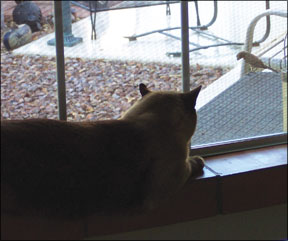We are told over and over that we should keep our beloved cats indoors to protect them from cars and other animals. But for those of us who work full-time or travel for business, what do our cats do when theyre home alone? There is some controversy as to whether or not cats need other cats as companions when their humans are away. And there are different views as to how elaborate to get when it comes to leaving toys and amusements for your cat. Bored or Content?

Bev Caldwell
288
How do you know if your cat is bored or lonely when you leave? “While a single cat left alone will be bored, it does not mean she will be miserable,” says David Spiegel, VMD, an animal behaviorist consultant in private practice in Swarthmore, PA. “Cats will spend most of their day sleeping, usually in a place of warmth and comfort,” he says. A windowsill is often a favorite place, especially when the sun warms the area. “Cats seldom get into trouble when left alone,” says Dr. Spiegel, “because when they have nothing to do, they do nothing and are content to have a bite to eat, groom themselves and settle down for a nice nap.” We know this is true because cats in the wild spend 80 percent of their time sleeping and conserving energy, says Dr. Spiegel.
If you really want to know what your cat does at home alone, “run a video recorder. And if you want to know if your cat howls or cries all day, run a voice recorder,” says Dr. Spiegel.
One of the best things about coming home is when your feline greets you – rubbing up against your legs, purring and wanting to be held. “Your cat is thrilled to see you because he enjoys your company, and by contrast to the monotony of the day, this is a big event,” says Dr. Spiegel. But dont mistake his joy to see you to mean that he was depressed during the day.
Rarely, a cats exuberance at welcoming you may indicate that she has experienced separation anxiety. But this more likely occurs when youve been away for several days or weeks.
Outdoor cats that have moved inside do have a harder time adjusting than felines that have always enjoyed the great indoors. Inevitably, outdoor veterans will miss the jumping, chasing and freedom from boundaries. You may have to leave them with more intriguing toys while youre away. And you should plan to spend extra interactive time with them when youre home.
Feline Friends
Another cat could be just what your single feline needs at home. Ideally, you should adopt two kittens together and they will grow up and entertain each other when youre away. But you can still try a new feline companion with your adult cat. (Outdoor cats will still miss the outdoors for a while even if there is another feline at home with them.) Just be careful not to pair an exuberant, playful kitten with an older cat that may not appreciate all the new feline fun and games.
Entertainment for Lonely Cats
If you are really concerned about your cat being bored, there are a few things you can do:
- Hide treats around the house. By concealing some kibble inside a box with an opening or holes, your cat can hone his predatory skills and have a fun time hunting the food out.
- “Leave Animal Planet on or some cat videos running while youre away,” says Dr.Spiegel. “We know from observational research that cats closely watch whats going on in these programs or videos.”
- Provide climbing frames or trees for your cat. Cats love to jump up and perch, looking down at the world.
- Get an aquarium (with a lid firmly attached) so your cat can go window fishing.
- Provide bird feeders outside your windows where your cat usually sits. This may satisfy your cats instinct for watching and stalking birds, without putting the birds at risk.
If your cat is well-adjusted and healthy, you dont have to worry too much about her being home alone while youre working during the day. Says Dr. Spiegel, “Cats enjoy the comfort, security and predictability of routine.”



